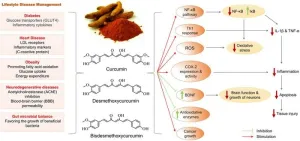(Press-News.org) A multidisciplinary team of UC Davis Health experts are calling on health systems to create wildfire preparedness action plans to support patients with preexisting respiratory diseases. They are urging providers to proactively put in place interventions to mitigate the effects of poor air quality from smoke.
Their article, published in the Journal of the COPD Foundation, identifies the needs of high-risk populations when affected by wildfire smoke. It outlines an action plan for health systems to help these groups with the burdens of poor air quality from wildfires.
“Patients being treated for respiratory conditions are at high-risk of exacerbations of symptoms when they are exposed to wildfire smoke,” said Reshma Gupta, chief of population health and accountable care at UC Davis Health and co-author of the article. “Unfortunately, wildfire frequency and severity are increasing in the United States and negatively affecting these clinically at-risk and underserved communities. So, there is a significant need for us to install interventions to mitigate the health threat posed by wildfires.”
Health impacts of poor air quality
Many components of wildfire smoke can have adverse impacts on health, especially for those with preexisting respiratory diseases.
Currently more than 34 million people living in the United States live with a chronic lung disease like asthma, chronic obstructive pulmonary disease (COPD) or Alpha-1 antitrypsin deficiency (AATD) according to the American Lung Association.
Exposure to wildfire-related air pollutants has been shown to cause and exacerbate diseases of the lungs, heart, brain and nervous system, skin and other major organs.
For patients being treated for preexisting respiratory conditions, poor air quality causes inflammation in the lungs. This can exacerbate symptoms and lead to emergency department visits and hospitalizations.
“Poor air quality can trigger exacerbations — acute increase in shortness of breath, cough, dyspnea — even leading to hospitalization,” explained Brooks Kuhn, co-director of the Comprehensive COPD Clinic at UC Davis Health and co-author of the article. “The impact is not just transient: Respiratory exacerbations lead to persistent and accelerated worsening of lung function.”
And adults are not the only ones at risk for these complications.
“Children also see these impacts when they are exposed to poor air quality from wildfires,” said Kiran Nandalike, chief of pediatric pulmonology at UC Davis Children’s Hospital. “As we see more wildfires impacting our communities each year, the urgency for health systems to outline a response to support patients is pressing.”
Wildfire population health approach
The targeted wildfire preparedness action plan adopted by UC Davis Health uses a population health approach. This means care teams with providers from different specialties proactively work with patients who are at higher risk of developing symptoms from poor air quality.
“A population health approach zeroes in on targeted interventions tailored to specific communities or population groups,” Gupta explained. “This approach considers a range of determinants, including social, economic, environmental and behavioral factors, which affect the health of these groups.”
The team’s wildfire preparedness action plan includes:
Identifying clinically at-risk and underserved patient populations using well-validated, condition-targeted registries
Assembling multidisciplinary care teams to understand the needs of these communities and patients
Creating custom analytics and wildfire-risk stratification
Developing care pathways based on wildfire-risk tiers by disease, risk of exposure and health care access
Identifying outcome measures tailored to interventions with a commitment to continuous, iterative improvement efforts
“We have seen population health approaches be successfully implemented to support patients with dementia, chronic kidney disease, and cancer,” Gupta said. “Using this model, we can adapt to the threat of poor air quality from wildfires and adopt a proactive approach to meet the needs of clinically at-risk and underserved patients.”
UC Davis Health experience with wildfires
As the regional academic health system in Northern California, UC Davis Health has been at the epicenter of recent wildfires – including the recent Park Fire, the fourth largest in California history. Because of this experience, the health system team has experience caring for patients in the most affected areas.
“Over the last few years, our clinicians have routinely cared for patients with physical, financial, and occupational barriers to clean air,” explained Kuhn. “We are uniquely equipped to share our experiences of serving communities harmed by wildfires.”
To direct wildfire preparedness interventions to those who need them, UC Davis Health has assembled a multidisciplinary care team to serve as liaisons between communities affected by wildfires and the health system. Some of the team’s efforts include:
Identifying at-risk patients
Providing air quality health education
Personalizing outreach to patients
Building and distributing "go-bags" with supplies for patients
Partnering with community organizations to provide support to patients
“The patients have been so grateful to receive this proactive approach,” Gupta said. “Often patients feel alone and closed off from the world when they are locked in their homes due to poor air quality. Working with our team empowers them to protect themselves in the comfort of their own home.”
Call to action
As climate change progresses, wildfires are now a yearly expectation in the United States. To meet the needs of clinically at-risk and underserved patients affected by this increasing health threat, the authors of the article are urging health systems to replace reactionary approaches with collaborative, innovative, and proactive approaches.
“In the coming years, it will be crucial to prepare health systems, clinicians and communities to manage the profound health impacts of environmental events and prevent potentially devastating consequences,” Gupta said. “We must come together to sustain this outreach and support patients at risk from wildfire exposure.”
END
UC Davis Health develops a real-time action plan to help patients with lung disease cope with wildfire smoke
Located near recent wildfires, UC Davis has experience caring for patients affected by poor air quality from smoke
2024-08-19
ELSE PRESS RELEASES FROM THIS DATE:
MIT study explains why laws are written in an incomprehensible style
2024-08-19
Legal documents are notoriously difficult to understand, even for lawyers. This raises the question: Why are these documents written in a style that makes them so impenetrable?
MIT cognitive scientists believe they have uncovered the answer to that question. Just as “magic spells” use special rhymes and archaic terms to signal their power, the convoluted language of legalese acts to convey a sense of authority, they conclude.
In a study that will appear in the journal of the Proceedings of the National Academy of Sciences, the researchers found that even non-lawyers use this type of language when asked to write laws.
“People seem to understand that there’s ...
Understanding of early life ecosystems highlighted in new publication
2024-08-19
STARKVILLE, Miss.—With a new understanding of past life on the planet through fossils, a Mississippi State biological sciences faculty member is helping researchers better predict Earth’s future.
In a new paper published in July in the esteemed peer-reviewed journal Proceedings of the National Academy of Sciences, Donald L. Hall Professor of Biology Matthew Brown unearths a specific area of under-studied fossils: microbial eukaryotes—more specifically, testate amoebae from 750 million ...
New research finds scalable mindfulness interventions delivered via telehealth improve pain and well-being for veterans with chronic pain
2024-08-19
MINNEAPOLIS/ST. PAUL (08/19/2024) — Mindfulness-based interventions delivered via telehealth in a scalable format can improve pain and overall well-being among veterans with chronic pain, according to new research published today in JAMA Internal Medicine.
In a randomized clinical trial, researchers aimed to test the effectiveness of two eight-week telehealth mindfulness-based interventions (MBIs) designed to be scalable and widely implemented in healthcare systems. MBIs help people pay attention non-judgmentally in the present moment and often involve practices like meditation, breathing exercises or gentle movement.
“Although mindfulness interventions are evidence-based ...
Current HIV prevention medication users often stigmatize other PrEP users as ‘promiscuous’
2024-08-19
Novel findings attend to attitudes of the stigmatized, rather than stigmatizers
Past research identified perception of promiscuity and assumptions that PrEP users are HIV-positive as key drivers of perceived stigma
Perception of stigma is highest among those who believe their sexual behavior puts them at risk for HIV
Knowing others who use PrEP does not influence one’s fear of potential discrimination
CHICAGO --- Public health messaging that drives stigma around Pre-exposure Prophylaxis (PrEP), a medication that can reduce HIV risk by up to 99%, appears to play a role in uptake of the medication. While the potential mismarketing of the drug is well-understood and ...
How "winner and loser effects" impact social rank in animals - and humans
2024-08-19
Research has shown that in many animals, the winners of a fight are more likely to win subsequent contests, while the losers tend to lose their following fights. In experiments where male stickleback fish were randomly introduced to another fish, 65% of the winning fish won the second match, while all losing fish lost the second contest.
Such winner and loser effects can greatly influence individual behavior and fitness. This effect happens in humans as well. In "Winner and Loser Effects and Social Rank in Humans," recently published in The Quarterly Review of Biology, authors Noah M. T. Smith and Reuven ...
Research study examines Alzheimer’s disease drug on tissue samples from people with Down syndrome
2024-08-19
People with Down syndrome are likely to develop Alzheimer’s disease at a young age, with autopsy studies showing that by age 40 years, the brains of individuals with Down syndrome have amyloid plaques. Yet people with Down syndrome have been excluded from or underrepresented in clinical trials of new therapies for treating AD. Lecanemab, which has been shown to target and remove beta-amyloid plaques, has been approved by the U.S. Food and Drug Administration to treat AD early in the disease’s progression. ...
International Society of Biomechanics recommendations for wearables-based motion capture
2024-08-19
Dr. Reed Gurchiek, an Assistant Professor in the Department of Bioengineering, Clemson University, and an Early-stage Investigator, was a co-first author of a recent publication in the Journal of Biomechanics titled “International Society of Biomechanics recommendations on the definition, estimation, and reporting of joint kinematics in human motion analysis applications using wearable inertial measurement technology”. A collaborative effort that incorporated feedback from the biomechanics community has produced recommendations in five categories: sensor characteristics ...
Rutgers researchers discover new way to control the sense of touch
2024-08-19
Rutgers researchers have found a new way to manage the receptors that control the sense of touch, which could lead to treating chronic pain more effectively.
“Identifying a natural molecule that specifically reduces pain sensitivity offers hope for new therapeutic strategies in the management of pain,” said Tibor Rohacs, a professor in the Department of Pharmacology, Physiology and Neuroscience at Rutgers New Jersey Medical School and a member of the Rutgers Brain Health Institute. “Our goal is to translate these findings into effective treatments that improve the quality of life for people suffering from chronic ...
New UH study targets early signs of vision loss in diabetic patients
2024-08-19
A $3.3 million study at the University of Houston College of Optometry will track the health of patients with prediabetes and diabetes to find out who might develop eye problems and be at risk for future vision loss. The study is being led by Wendy Harrison, associate professor, and is underwritten by the National Eye Institute.
Vision loss in type 2 diabetes results from diabetic retinopathy, caused by damage to blood vessels in the retina, the light-sensitive layer of tissue in the back of your eye. The disease can appear without warning.
“The ...
Herbal-based nutraceuticals in management of lifestyle diseases: Experience from Indian population
2024-08-19
Lifestyle diseases, also known as non-communicable diseases (NCDs), have emerged as a major health burden globally, including in India. These diseases, such as obesity, diabetes, hypertension, cardiovascular diseases, and metabolic disorders, are primarily caused by unhealthy lifestyle choices like sedentary behavior, poor dietary habits, and stress. According to the World Health Organization (WHO), NCDs are responsible for 41 million deaths annually, accounting for 74% of all global deaths. Notably, 86% of these premature deaths occur in low- and middle-income countries.
The increasing prevalence of lifestyle diseases ...
LAST 30 PRESS RELEASES:
Why chronic pain lasts longer in women: Immune cells offer clues
Toxic exposure creates epigenetic disease risk over 20 generations
More time spent on social media linked to steroid use intentions among boys and men
New study suggests a “kick it while it’s down” approach to cancer treatment could improve cure rates
Milken Institute, Ann Theodore Foundation launch new grant to support clinical trial for potential sarcoidosis treatment
New strategies boost effectiveness of CAR-NK therapy against cancer
Study: Adolescent cannabis use linked to doubling risk of psychotic and bipolar disorders
Invisible harms: drug-related deaths spike after hurricanes and tropical storms
Adolescent cannabis use and risk of psychotic, bipolar, depressive, and anxiety disorders
Anxiety, depression, and care barriers in adults with intellectual and developmental disabilities
Study: Anxiety, gloom often accompany intellectual deficits
Massage Therapy Foundation awards $300,000 research grant to the University of Denver
Gastrointestinal toxicity linked to targeted cancer therapies in the United States
Countdown to the Bial Award in Biomedicine 2025
Blood marker from dementia research could help track aging across the animal world
Birds change altitude to survive epic journeys across deserts and seas
Here's why you need a backup for the map on your phone
ACS Central Science | Researchers from Insilico Medicine and Lilly publish foundational vision for fully autonomous “Prompt-to-Drug” pharmaceutical R&D
Increasing the number of coronary interventions in patients with acute myocardial infarction does not appear to reduce death rates
Tackling uplift resistance in tall infrastructures sustainably
Novel wireless origami-inspired smart cushioning device for safer logistics
Hidden genetic mismatch, which triples the risk of a life-threatening immune attack after cord blood transplantation
Physical function is a crucial predictor of survival after heart failure
Striking genomic architecture discovered in embryonic reproductive cells before they start developing into sperm and eggs
Screening improves early detection of colorectal cancer
New data on spontaneous coronary artery dissection (SCAD) – a common cause of heart attacks in younger women
How root growth is stimulated by nitrate: Researchers decipher signalling chain
Scientists reveal our best- and worst-case scenarios for a warming Antarctica
Cleaner fish show intelligence typical of mammals
AABNet and partners launch landmark guide on the conservation of African livestock genetic resources and sustainable breeding strategies
[Press-News.org] UC Davis Health develops a real-time action plan to help patients with lung disease cope with wildfire smokeLocated near recent wildfires, UC Davis has experience caring for patients affected by poor air quality from smoke


